【查漏补缺】外研(新标准)版七年级下册英语强化训练:单词拼写(含解析)
文档属性
| 名称 | 【查漏补缺】外研(新标准)版七年级下册英语强化训练:单词拼写(含解析) |
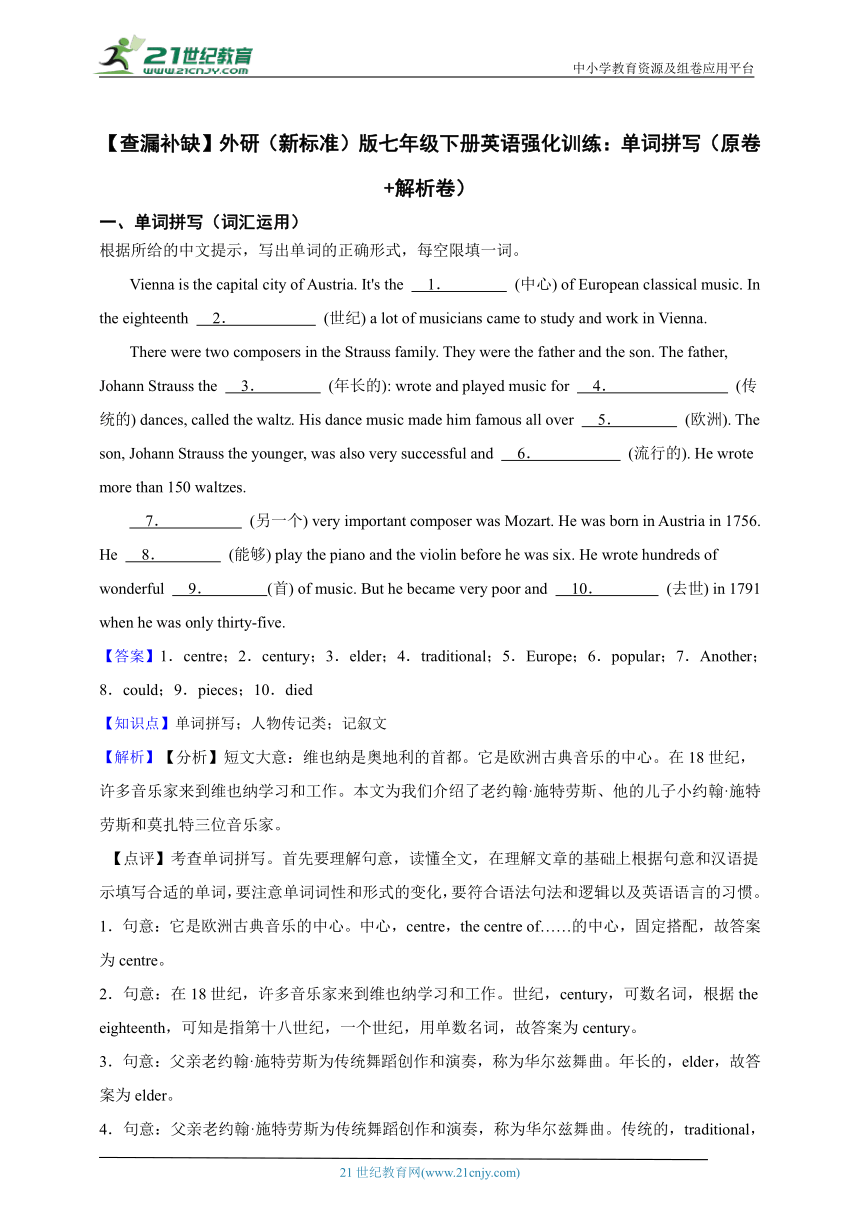
|
|
| 格式 | zip | ||
| 文件大小 | 874.9KB | ||
| 资源类型 | 试卷 | ||
| 版本资源 | 外研版 | ||
| 科目 | 英语 | ||
| 更新时间 | 2023-06-12 00:00:00 | ||
图片预览

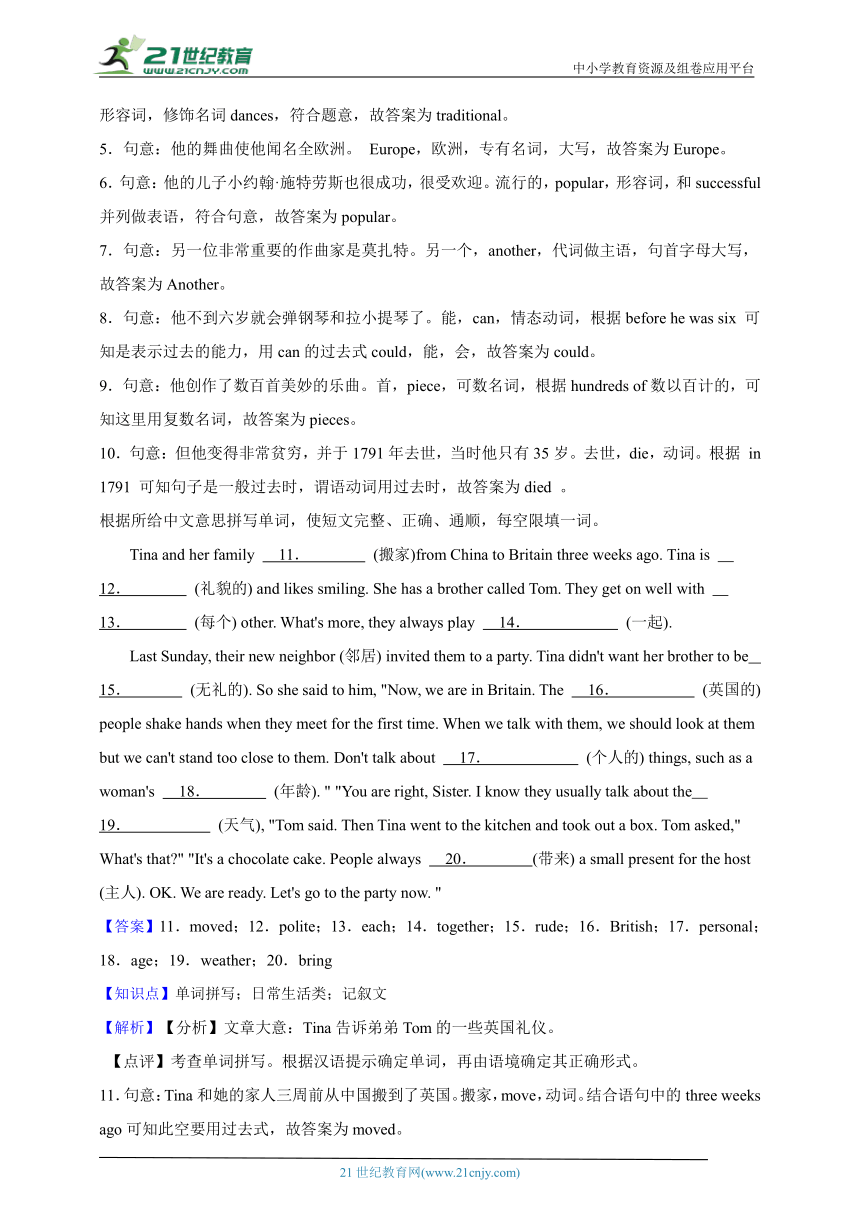
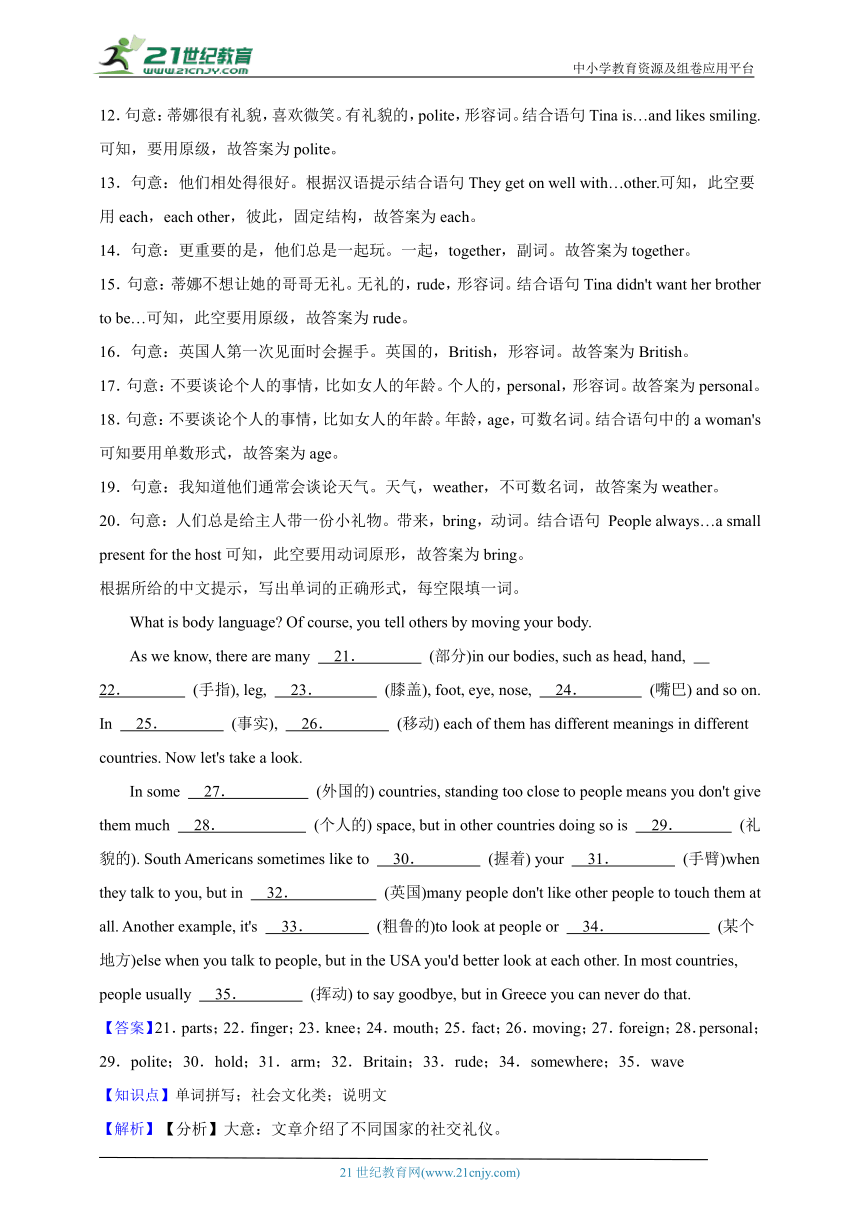
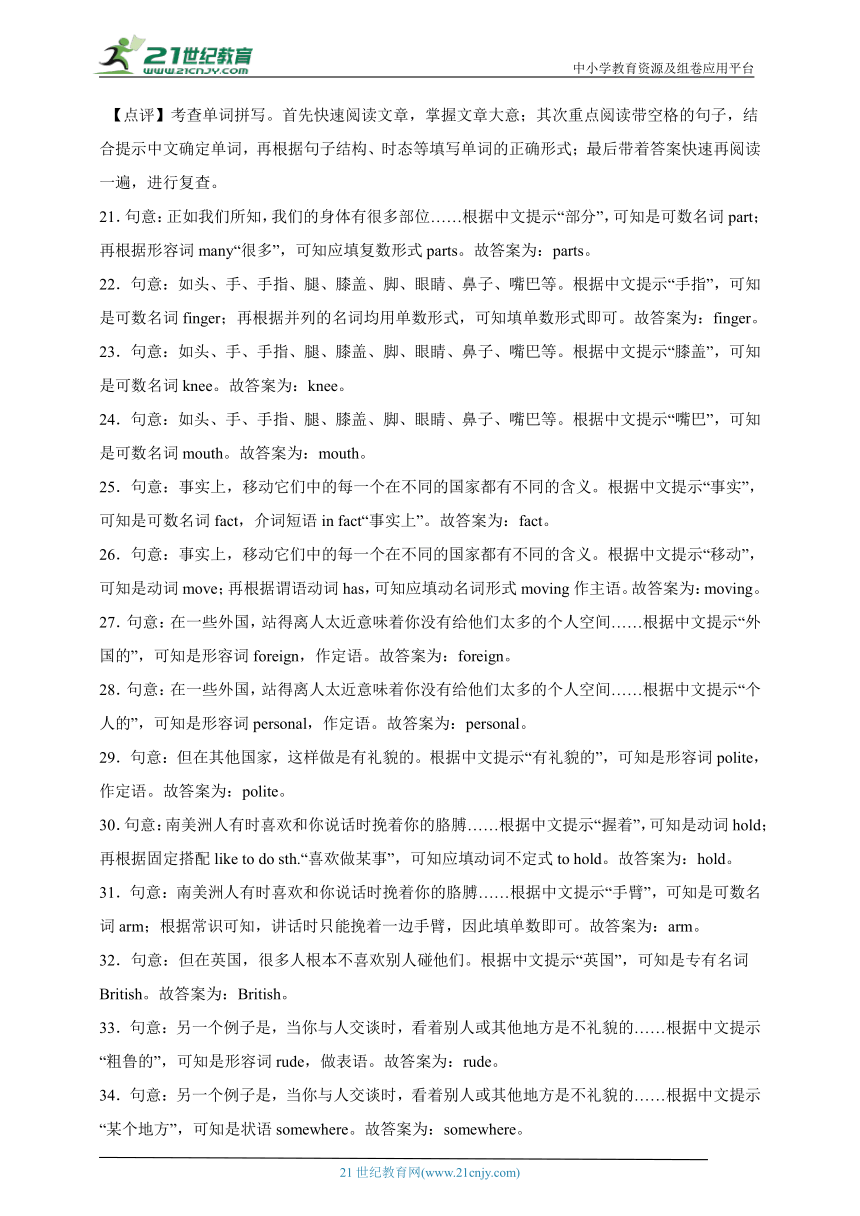
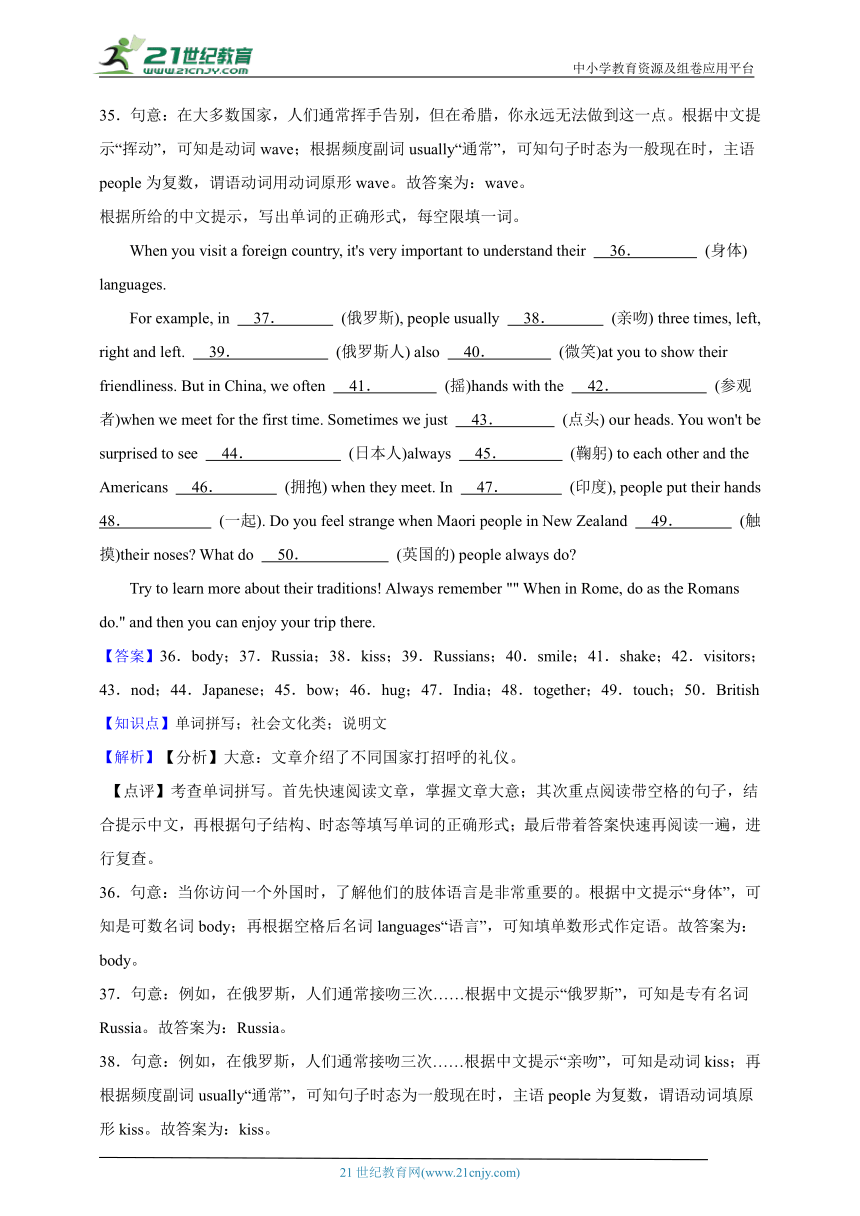
文档简介
中小学教育资源及组卷应用平台
【查漏补缺】外研(新标准)版七年级下册英语强化训练:单词拼写(原卷+解析卷)
一、单词拼写(词汇运用)
根据所给的中文提示,写出单词的正确形式,每空限填一词。
Vienna is the capital city of Austria. It's the 1. (中心) of European classical music. In the eighteenth 2. (世纪) a lot of musicians came to study and work in Vienna.
There were two composers in the Strauss family. They were the father and the son. The father, Johann Strauss the 3. (年长的): wrote and played music for 4. (传统的) dances, called the waltz. His dance music made him famous all over 5. (欧洲). The son, Johann Strauss the younger, was also very successful and 6. (流行的). He wrote more than 150 waltzes.
7. (另一个) very important composer was Mozart. He was born in Austria in 1756. He 8. (能够) play the piano and the violin before he was six. He wrote hundreds of wonderful 9. (首) of music. But he became very poor and 10. (去世) in 1791 when he was only thirty-five.
【答案】1.centre;2.century;3.elder;4.traditional;5.Europe;6.popular;7.Another;8.could;9.pieces;10.died
【知识点】单词拼写;人物传记类;记叙文
【解析】【分析】短文大意:维也纳是奥地利的首都。它是欧洲古典音乐的中心。在18世纪,许多音乐家来到维也纳学习和工作。本文为我们介绍了老约翰·施特劳斯、他的儿子小约翰·施特劳斯和莫扎特三位音乐家。
【点评】考查单词拼写。首先要理解句意,读懂全文,在理解文章的基础上根据句意和汉语提示填写合适的单词,要注意单词词性和形式的变化,要符合语法句法和逻辑以及英语语言的习惯。
1.句意:它是欧洲古典音乐的中心。中心,centre,the centre of……的中心,固定搭配,故答案为centre。
2.句意:在18世纪,许多音乐家来到维也纳学习和工作。世纪,century,可数名词,根据the eighteenth,可知是指第十八世纪,一个世纪,用单数名词,故答案为century。
3.句意:父亲老约翰·施特劳斯为传统舞蹈创作和演奏,称为华尔兹舞曲。年长的,elder,故答案为elder。
4.句意:父亲老约翰·施特劳斯为传统舞蹈创作和演奏,称为华尔兹舞曲。传统的,traditional,形容词,修饰名词dances,符合题意,故答案为traditional。
5.句意:他的舞曲使他闻名全欧洲。 Europe,欧洲,专有名词,大写,故答案为Europe。
6.句意:他的儿子小约翰·施特劳斯也很成功,很受欢迎。流行的,popular,形容词,和successful并列做表语,符合句意,故答案为popular。
7.句意:另一位非常重要的作曲家是莫扎特。另一个,another,代词做主语,句首字母大写,故答案为Another。
8.句意:他不到六岁就会弹钢琴和拉小提琴了。能,can,情态动词,根据before he was six 可知是表示过去的能力,用can的过去式could,能,会,故答案为could。
9.句意:他创作了数百首美妙的乐曲。首,piece,可数名词,根据hundreds of数以百计的,可知这里用复数名词,故答案为pieces。
10.句意:但他变得非常贫穷,并于1791年去世,当时他只有35岁。去世,die,动词。根据 in 1791 可知句子是一般过去时,谓语动词用过去时,故答案为died 。
根据所给中文意思拼写单词,使短文完整、正确、通顺,每空限填一词。
Tina and her family 11. (搬家)from China to Britain three weeks ago. Tina is 12. (礼貌的) and likes smiling. She has a brother called Tom. They get on well with 13. (每个) other. What's more, they always play 14. (一起).
Last Sunday, their new neighbor (邻居) invited them to a party. Tina didn't want her brother to be 15. (无礼的). So she said to him, "Now, we are in Britain. The 16. (英国的) people shake hands when they meet for the first time. When we talk with them, we should look at them but we can't stand too close to them. Don't talk about 17. (个人的) things, such as a woman's 18. (年龄). " "You are right, Sister. I know they usually talk about the 19. (天气), "Tom said. Then Tina went to the kitchen and took out a box. Tom asked," What's that " "It's a chocolate cake. People always 20. (带来) a small present for the host (主人). OK. We are ready. Let's go to the party now. "
【答案】11.moved;12.polite;13.each;14.together;15.rude;16.British;17.personal;18.age;19.weather;20.bring
【知识点】单词拼写;日常生活类;记叙文
【解析】【分析】文章大意:Tina告诉弟弟Tom的一些英国礼仪。
【点评】考查单词拼写。根据汉语提示确定单词,再由语境确定其正确形式。
11.句意:Tina和她的家人三周前从中国搬到了英国。搬家,move,动词。结合语句中的three weeks ago可知此空要用过去式,故答案为moved。
12.句意:蒂娜很有礼貌,喜欢微笑。有礼貌的,polite,形容词。结合语句Tina is…and likes smiling.可知,要用原级,故答案为polite。
13.句意:他们相处得很好。根据汉语提示结合语句They get on well with…other.可知,此空要用each,each other,彼此,固定结构,故答案为each。
14.句意:更重要的是,他们总是一起玩。一起,together,副词。故答案为together。
15.句意:蒂娜不想让她的哥哥无礼。无礼的,rude,形容词。结合语句Tina didn't want her brother to be…可知,此空要用原级,故答案为rude。
16.句意:英国人第一次见面时会握手。英国的,British,形容词。故答案为British。
17.句意:不要谈论个人的事情,比如女人的年龄。个人的,personal,形容词。故答案为personal。
18.句意:不要谈论个人的事情,比如女人的年龄。年龄,age,可数名词。结合语句中的a woman's可知要用单数形式,故答案为age。
19.句意:我知道他们通常会谈论天气。天气,weather,不可数名词,故答案为weather。
20.句意:人们总是给主人带一份小礼物。带来,bring,动词。结合语句 People always…a small present for the host可知,此空要用动词原形,故答案为bring。
根据所给的中文提示,写出单词的正确形式,每空限填一词。
What is body language Of course, you tell others by moving your body.
As we know, there are many 21. (部分)in our bodies, such as head, hand, 22. (手指), leg, 23. (膝盖), foot, eye, nose, 24. (嘴巴) and so on. In 25. (事实), 26. (移动) each of them has different meanings in different countries. Now let's take a look.
In some 27. (外国的) countries, standing too close to people means you don't give them much 28. (个人的) space, but in other countries doing so is 29. (礼貌的). South Americans sometimes like to 30. (握着) your 31. (手臂)when they talk to you, but in 32. (英国)many people don't like other people to touch them at all. Another example, it's 33. (粗鲁的)to look at people or 34. (某个地方)else when you talk to people, but in the USA you'd better look at each other. In most countries, people usually 35. (挥动) to say goodbye, but in Greece you can never do that.
【答案】21.parts;22.finger;23.knee;24.mouth;25.fact;26.moving;27.foreign;28.personal;29.polite;30.hold;31.arm;32.Britain;33.rude;34.somewhere;35.wave
【知识点】单词拼写;社会文化类;说明文
【解析】【分析】大意:文章介绍了不同国家的社交礼仪。
【点评】考查单词拼写。首先快速阅读文章,掌握文章大意;其次重点阅读带空格的句子,结合提示中文确定单词,再根据句子结构、时态等填写单词的正确形式;最后带着答案快速再阅读一遍,进行复查。
21.句意:正如我们所知,我们的身体有很多部位……根据中文提示“部分”,可知是可数名词part;再根据形容词many“很多”,可知应填复数形式parts。故答案为:parts。
22.句意:如头、手、手指、腿、膝盖、脚、眼睛、鼻子、嘴巴等。根据中文提示“手指”,可知是可数名词finger;再根据并列的名词均用单数形式,可知填单数形式即可。故答案为:finger。
23.句意:如头、手、手指、腿、膝盖、脚、眼睛、鼻子、嘴巴等。根据中文提示“膝盖”,可知是可数名词knee。故答案为:knee。
24.句意:如头、手、手指、腿、膝盖、脚、眼睛、鼻子、嘴巴等。根据中文提示“嘴巴”,可知是可数名词mouth。故答案为:mouth。
25.句意:事实上,移动它们中的每一个在不同的国家都有不同的含义。根据中文提示“事实”,可知是可数名词fact,介词短语in fact“事实上”。故答案为:fact。
26.句意:事实上,移动它们中的每一个在不同的国家都有不同的含义。根据中文提示“移动”,可知是动词move;再根据谓语动词has,可知应填动名词形式moving作主语。故答案为:moving。
27.句意:在一些外国,站得离人太近意味着你没有给他们太多的个人空间……根据中文提示“外国的”,可知是形容词foreign,作定语。故答案为:foreign。
28.句意:在一些外国,站得离人太近意味着你没有给他们太多的个人空间……根据中文提示“个人的”,可知是形容词personal,作定语。故答案为:personal。
29.句意:但在其他国家,这样做是有礼貌的。根据中文提示“有礼貌的”,可知是形容词polite,作定语。故答案为:polite。
30.句意:南美洲人有时喜欢和你说话时挽着你的胳膊……根据中文提示“握着”,可知是动词hold;再根据固定搭配like to do sth.“喜欢做某事”,可知应填动词不定式to hold。故答案为:hold。
31.句意:南美洲人有时喜欢和你说话时挽着你的胳膊……根据中文提示“手臂”,可知是可数名词arm;根据常识可知,讲话时只能挽着一边手臂,因此填单数即可。故答案为:arm。
32.句意:但在英国,很多人根本不喜欢别人碰他们。根据中文提示“英国”,可知是专有名词British。故答案为:British。
33.句意:另一个例子是,当你与人交谈时,看着别人或其他地方是不礼貌的……根据中文提示“粗鲁的”,可知是形容词rude,做表语。故答案为:rude。
34.句意:另一个例子是,当你与人交谈时,看着别人或其他地方是不礼貌的……根据中文提示“某个地方”,可知是状语somewhere。故答案为:somewhere。
35.句意:在大多数国家,人们通常挥手告别,但在希腊,你永远无法做到这一点。根据中文提示“挥动”,可知是动词wave;根据频度副词usually“通常”,可知句子时态为一般现在时,主语people为复数,谓语动词用动词原形wave。故答案为:wave。
根据所给的中文提示,写出单词的正确形式,每空限填一词。
When you visit a foreign country, it's very important to understand their 36. (身体) languages.
For example, in 37. (俄罗斯), people usually 38. (亲吻) three times, left, right and left. 39. (俄罗斯人) also 40. (微笑)at you to show their friendliness. But in China, we often 41. (摇)hands with the 42. (参观者)when we meet for the first time. Sometimes we just 43. (点头) our heads. You won't be surprised to see 44. (日本人)always 45. (鞠躬) to each other and the Americans 46. (拥抱) when they meet. In 47. (印度), people put their hands 48. (一起). Do you feel strange when Maori people in New Zealand 49. (触摸)their noses What do 50. (英国的) people always do
Try to learn more about their traditions! Always remember "" When in Rome, do as the Romans do." and then you can enjoy your trip there.
【答案】36.body;37.Russia;38.kiss;39.Russians;40.smile;41.shake;42.visitors;43.nod;44.Japanese;45.bow;46.hug;47.India;48.together;49.touch;50.British
【知识点】单词拼写;社会文化类;说明文
【解析】【分析】大意:文章介绍了不同国家打招呼的礼仪。
【点评】考查单词拼写。首先快速阅读文章,掌握文章大意;其次重点阅读带空格的句子,结合提示中文,再根据句子结构、时态等填写单词的正确形式;最后带着答案快速再阅读一遍,进行复查。
36.句意:当你访问一个外国时,了解他们的肢体语言是非常重要的。根据中文提示“身体”,可知是可数名词body;再根据空格后名词languages“语言”,可知填单数形式作定语。故答案为:body。
37.句意:例如,在俄罗斯,人们通常接吻三次……根据中文提示“俄罗斯”,可知是专有名词Russia。故答案为:Russia。
38.句意:例如,在俄罗斯,人们通常接吻三次……根据中文提示“亲吻”,可知是动词kiss;再根据频度副词usually“通常”,可知句子时态为一般现在时,主语people为复数,谓语动词填原形kiss。故答案为:kiss。
39.句意:俄罗斯人也会对你微笑来展示他们的友好。根据中文提示“俄罗斯人”,可知是可数名词Russian;再根据说的应是大多数俄罗斯人,因此填复数形式Russians。故答案为:Russians。
40.句意:俄罗斯人也会对你微笑来展示他们的友好。根据中文提示“微笑”,可知是动词smile;再根据上文句子时态为一般现在时,可知此处也为一般现在时,主语Russians为复数,谓语动词填原形smile。故答案为:smile。
41.句意:但在中国,当我们第一次见面时,我们经常和来访者握手。根据中文提示“摇”,可知是动词shake;再根据主语we为复数,可知谓语动词填动词原形shake。故答案为:shake。
42.句意:但在中国,当我们第一次见面时,我们经常和来访者握手。根据中文提示“参观者”,可知是可数名词visitor;再根据空格前无不定冠词及单数等限制,可知应填复数形式visitors。故答案为:visitors。
43.句意:有时我们只是点头。根据中文提示“点头”,可知是动词nod;再根据主语we为复数,可知谓语动词填动词原形nod。故答案为:nod。
44.句意:看到日本人总是互相鞠躬,你不会感到惊讶……根据中文提示“日本人”,可知是可数名词Japanese。故答案为:Japanese。
45.句意:看到日本人总是互相鞠躬,你不会感到惊讶……根据中文提示“鞠躬”,可知是动词bow;再根据频度副词always“总是”,可知句子时态为一般现在时,主语Japanese为复数,谓语动词填原形bow。故答案为:bow。
46.句意:美国人见面时拥抱。根据中文提示“拥抱”,可知是动词hug;再根据前半句时态为一般现在时,此处主语Americans为复数,谓语动词填原形hug。故答案为:hug。
47.句意:在印度,人们双手合十。根据中文提示“印度”,可知是专有名词India。故答案为:India。
48.句意:在印度,人们双手合十。根据中文提示“一起”,可知是副词together,作状语。故答案为:together。
49.句意:当新西兰的毛利人触摸他们的鼻子时,你会感到奇怪吗?根据中文提示“触摸”,可知是动词touch;主语people为复数,谓语动词用动词原形touch。故答案为:touch。
50.句意:英国人总是做什么?根据中文提示“英国的”,可知是形容词British。故答案为:British。
根据所给的中文提示,写出单词的正确形式,每空限填一词。
Tomorrow lots of 51. (外国的)students are coming to our school. Here are some ways to 52. (欢迎) them.
When we meet people from the Middle East, we can stand close to them. But remember to give 53. (游客;观光者) from North America more 54. (个人的)space. How about touching people People in 55. (不列颠;英国) don't like to touch other people, but South Americans sometimes 56. (握着)your arm when they talk to you. In most countries, people usually 57. (挥手)to say goodbye. But in Greece, it's impolite! In 58. (事实上) , it's very 59. (粗鲁的) .
All in all, when we meet the new students from other countries, try to understand and respect their body 60. (语言).
【答案】51.foreign;52.welcome;53.visitors;54.personal;55.Britain;56.hold;57.wave;58.fact;59.rude;60.language
【知识点】单词拼写;社会文化类;说明文
【解析】【分析】主要讲述了不同国家的人有不同的肢体语言,当我们遇见来自其他国家的新学生时,试着理解和尊重他们的肢体语言。
【点评】考查单词拼写,首先识记单词词义及词性,然后结合语法和句意确定单词正确形式。
51.句意:明天许多外国的学生将来到我们的学校。外国的用foreign,形容词,修饰名词students。故答案为foreign。
52.句意:这里是一些欢迎他们的方法。欢迎用welcome,实义动词,ways to do sth.做某事的方式方法,固定搭配,所以welcome用原形,故答案为welcome。
53.句意:但是记得给来自北美的游客更多的个人空间。游客;观光者用visitor,可数名词,前面没有表示单数的a或者one,所以用visitor的复数形式visitors。故答案为visitors。
54.句意:但是记得给来自北美的游客更多的个人空间。个人的用personal,形容词,修饰名词space。故答案为personal。
55.句意:英国人不喜欢碰其他人,但是当南美人和你说话的时候,他们有时会握着你的手臂。不列颠、英国用Britain,专有名词。故答案为Britain。
56.句意:英国人不喜欢碰其他人,但是当南美人和你说话的时候,他们有时会握着你的手臂。握着用hold,实义动词。sometimes与一般现在时连用,所以本句的时态为一般现在时,主语South Americans是复数名词,结合时态谓语动词hold要用动词原形。故答案为hold。
57.句意:在大多数国家,人们通常挥手道别。挥手用wave,实义动词。usually与一般现在时连用,所以本句的时态为一般现在时。people是表示总称意义的名词,作主语时谓语动词要用复数,所以结合时态谓语动词wave要用动词原形。故答案为wave。
58.句意:事实上,它是粗鲁。事实上用in fact,固定搭配,故答案为fact。
59.句意:事实上,这很粗鲁。it's是it is的缩写形式。粗鲁的用rude,形容词,与be动词is构成系表结构。故答案为rude。
60.句意:总而言之,当我们遇见来自其他国家的新学生时,试着理解和尊重他们的肢体语言语言用language,可数名词,body language肢体语言,固定搭配,故答案为language。
根据所给中文意思拼写单词,使短文完整、正确、通顺,每空限填一词。
Sam is my friend and he is a 61. (法国的) boy. He can speak English very well. I heard from him yesterday. He told me lots of 62. (绝妙的) things in the email. He visited the US with his family last week. They 63. (花费) four days in New York and three days in Los Angeles. In New York, they went to the 64. (举世闻名的) Metropolitan Museum of Art. They took lots of 65. (照片) there. Ln Los Angeles, they went to Disneyland first. Sam was 66. (兴奋的)to see his favourite Mickey Mouse. The next day they 67. (放松) in the hotel during the daytime. In the evening, they went for a walk when all the 68. (灯) were on the street. On the last day, they went to Hollywood. They 69. (遇到)some movie stars there. After that they went home 70. (乘) plane. It was a really fantastic trip.
【答案】61.French;62.wonderful;63.spent;64.world- famous;65.photos;66.excited;67.relaxed;68.lights;69.met;70.by
【知识点】单词拼写;旅游观光类;记叙文
【解析】【分析】文章大意:本文介绍了Sam一家在美国旅游的所见所闻。
【点评】考查单词拼写填空,注意根据所给词义和句子结构确定词性和词形。
61.句意:他是一个法国男孩,使用形容词French"法国的",用作定语,故答案为:French。
62.句意:他在电子邮件里告诉了我很多很棒的东西的东西,使用形容词wonderful"奇妙的、神奇的",用作定语,故答案为:wonderful。
63.句意:他们在纽约度过了四天,使用动词spend"花费",用作谓语动词,匹配短文,用一般过去时叙事,用其过去式spent,故答案为:spent。
64.句意他们去了著名的大都会艺术博物馆,使用形容词world- famous"知名的、著名的",用作定语,故答案为:world- famous。
65.句意:他们在那里拍了很多的照片,匹配空前lots of,使用名词复数photos"照片",故答案为photos。
66.句意:山姆很激动能看到他最喜欢的米老鼠,使用形容词excited"兴奋的、激动的", 故答案为:excited。
67.句意:第二天,他们白天在酒店放松,使用动词relax"放松、轻松",用作谓语动词,匹配短文,用一般过去时叙事,用其过去式relaxed,故答案为:relaxed。
68.句意:晚上,当在街所有灯都亮了,他们去散步,匹配空前all,以及其后系动词,使用名词复数lights"灯",用作主语,故答案为:lights。
69.句意:他们在那里遇到了一些电明星,使用动词meet"遇见、碰见",用作谓语动词,匹配短文,用一般过去时叙事,用其过去式met,故答案为:met。
70.句意:他们乘飞机回家,使用介词by"通过…(途径)",引导介词短语作用状语,表示方法,故答案为:by。
根据所给的中文提示,写出单词的正确形式,每空限填一词。
It's interesting that people from different countries may use different body language to express the same meaning and feeling. For example, when meeting others for the first time, Chinese people usually 71. (握手)hands and 72. (微笑). American people shake hands and sometimes 73. (亲吻). In 74. (印度), people put their hands 75. (一起;共同) and 76. (点) their 77. (头). In 78. (俄罗斯), people kiss each other three times. Maori people 79. (触摸) 80. (鼻子). So next time when you meet people from other countries, try to understand and respect their body language.
【答案】71.shake;72.smile;73.kiss;74.India;75.together;76.nod;77.heads;78.Russia;79.touch;80.noses
【知识点】单词拼写;社会文化类;说明文
【解析】【分析】本文主要介绍了不同国家的人们使用不同的肢体语言能够表达相同的问候礼仪。
【点评】考查单词拼写,注意根据句意以及首字母和句子结构确定词性和词形。
71.句意:例如,当第一次与他人见面时,中国人通常握手并微笑。握手,shake,动词。根据主语为people,人们,文章时态为一般现在时,可知此处应用动词原形shake,故答案为shake。
72.句意:例如,当第一次与他人见面时,中国人通常握手并微笑。微笑,smile,动词。根据空格前and,此处应用空格前shake保持一致,应用动词原形smile,故答案为smile。
73.句意:美国人握手,有时亲吻。亲吻,kiss,动词。根据空格前and,可知此处应与shake保持一致,应用动词原形kiss,故答案为kiss。
74.句意:在印度,人们会双手合十并点头。印度,India,专有名词,根据空格前in,后加地点名词,应用India,故答案为India。
75.句意:在印度,人们会双手合十并点头。一起,together,副词。此处修饰put their hands,放手,应用together,故答案为together。
76.句意:在印度,人们会双手合十并点头。点,nod,动词。根据空格前and,可知此处应与put保持一致,应用动词原形nod,故答案为nod。
77.句意:在印度,人们会双手合十并点头。头,head,名词,根据空格前their,他们的,可知此处应用名词的复数形式,应用heads,故答案为heads。
78.句意:在俄罗斯,人们互相亲吻三次。俄罗斯,Russia,专有名词,根据空格前in,后加地点名词,可知此处应用Russia,故答案为Russia。
79.句意:毛利人用手摸鼻子。触摸,touch,动词。根据主语people,文章时态为一般现在时,可知此处应用动词原形touch,故答案为touch。
80.句意:毛利人用手摸鼻子。鼻子,nose,名词。根据空格前people,人们触摸鼻子,可知此处应用名词复数形式,应用noses,故答案为noses。
根据所给的中文提示,写出单词的正确形式,每空限填一词。
Betty and Jenny are on a trip to Paris. They 81. (到达)by plane the day before yesterday. Aunt Joan and Uncle Pete met them at the 82. (机场). They were tired so they 83. (放松) at home and began the tour of Paris yesterday.
Yesterday they went to the 84. (世界著名的)Louvre Museum. There they saw the Mona Lisa and had dinner in a 85. (法国的)restaurant. There are lots of street 86. (市场), and they 87. (卖) fruit and vegetables. This morning they went there and did some shopping. Then they took the 88. (地铁) to the Eiffel Tower. There were so many 89. (游客)that they had to wait in 90. (列,行). Later, they went to the 91. (顶端) of the tower. There they waited 92. (直到)the 93. (灯) were all on. It looked really 94. (绝妙的) and they had a good view of the whole city.
Tomorrow they are going to visit a famous 95. (宫殿)and take a boat tour. They are sure they will have a great time.
【答案】81.arrived;82.airport;83.relaxed;84.world- famous;85.French;86.markets;87.sell;88.underground;89.tourists;90.line;91.top;92.till/until;93.lights;94.wonderful;95.palace
【知识点】单词拼写;旅游观光类;记叙文
【解析】【分析】大意:文章介绍了Betty去巴黎旅行的经历。
【点评】考查单词拼写。注意首先通读全文,掌握文章大意;再细读句子,结合提示中文和句子成分等,填写单词的正确形式;最后细读全文,进行复查。
81.句意:他们前天乘飞机到达。根据中文提示“到达”,以及空格后无地点,可知是不及物动词arrive;再根据时间状语 the day before yesterday 前天,可知句子时态为一般过去时应填动词过去式arrived。故答案为:arrived。
82.句意:琼阿姨和皮特叔叔在机场迎接他们。根据中文提示“机场”,可知是可数名词airport;再根据定冠词the,可知特指到达的这个机场,填单数形式即可。故答案为:airport。
83.句意:他们累了,所以他们在家里放松下来,昨天开始了巴黎之旅。根据中文提示“放松”,可知是动词relax;再根据并列谓语began,可知句子时态为一般过去时,应填动词过去式relaxed。故答案为:relaxed。
84.句意:昨天他们去了世界著名的卢浮宫博物馆。根据中文提示“世界著名的”,可知是形容词短语 world- famous 。故答案为: world- famous 。
85.句意:在那里,他们看到了蒙娜丽莎,并在一家法国餐厅吃了晚饭。根据中文提示“法国的”,可知是形容词French。故答案为:French。
86.句意:有很多街市……根据中文提示“市场”,可知是可数名词market;再根据空格前定语lots of“很多”,可知应填可数名词复数markets。故答案为:markets。
87.句意:他们卖水果和蔬菜。根据中文提示“卖”,可知是动词sell;再根据陈述的是日常的习惯,可知句子时态为一般现在时,主语they为复数,谓语动词用原形。故答案为:sell。
88.句意:然后他们乘地铁去埃菲尔铁塔。根据中文提示“地铁”,可知是不可数名词underground。故答案为:underground。
89.句意:游客太多了,他们不得不排队等候。根据中文提示“游客”,可知是可数名词tourist;再根据空格前形容词many“很多”,可知应填复数形式tourists。故答案为:tourists。
90.句意:游客太多了,他们不得不排队等候。根据中文提示“ 列,行 ”,可知是可数名词line;再根据介词in,可知是介词短语in line“排队”。故答案为:line。
91.句意:后来,他们去了塔顶。根据中文提示“顶端”,可知是可数名词top;再根据定语of the tower塔的,可知只有一个塔顶,填单数形式即可。故答案为:top。
92.句意:他们在那里等着,直到灯都亮了。根据中文提示“直到”,可知是连词till/until。故答案为:till/until。
93.句意:他们在那里等着,直到灯都亮了。根据中文提示“灯”,可知是可数名词light;再根据be动词were,可知主语应为复数,应填复数形式lights。故答案为:lights。
94.句意:它看起来真的是绝妙的,他们可以很好地看到整个城市。根据中文提示“绝妙的”,可知是形容词wonderful。故答案为:wonderful。
95.句意:明天他们将参观一座著名的宫殿并乘船游览。根据中文提示“宫殿”,可知是可数名词palace;再根据空格前不定冠词a,可知填单数形式即可。故答案为:palace。
根据所给的中文提示,写出单词的正确形式,每空限填一词。
Betty says Los Angeles is a good place to visit. Two years ago, she went there 96. (和……一起) her parents, and she enjoyed it a lot. It 97. (花费) them about nine hours to get there, and her friends 98. (遇见) them and 99. (驾驶) them to their home. They went to Disneyland, and they were 100. (激动的)to see Snow white and Mickey Mouse. They 101. (待) there for two days and went to Hollywood.
In the 102. (太平洋) Ocean at oan1taMonica, they had great fun 103. (游泳) in the sea.
Now summer vacation is coming again. Betty is going to Paris. Lingling and Tony are going on a holiday 104. (旅行), too. No matter where they will go, they are sure they can enjoy 105. (他们自己).
【答案】96.With;97.took;98.met;99.drove;100.excited;101.stayed;102.Pacific;103.swimming;104.journey;105.themselves
【知识点】单词拼写;旅游观光类;记叙文
【解析】【分析】大意:文章主要介绍了Betty两年前在洛杉矶的旅行以及将去法国旅行的计划。
【点评】考查单词拼写。注意首先通读全文,掌握文章大意;再细读句子,结合提示和句子成分等,填写单词的正确形式;最后细读全文,进行复查。
96.句意:两年前,她和父母一起去了那里……根据中文提示“ 和……一起 ”,可知是介词with,固定搭配go with“和……一起去……”。故答案为:with。
97.句意:他们大约需要九个小时才能到达那里……根据主语it,空格后 about nine hours 大约九小时,以及中文提示“花费”,可知是动词take,事情发生在过去,句子时态为一般过去时,应填动词过去式took。故答案为:took。
98.句意:她的朋友遇见了他们……根据中文提示“遇见”,可知是动词meet;再根据句子时态为一般过去时,可知应填动词过去式met。故答案为:met。
99.句意:开车送他们回家。根据中文提示“驾驶”,可知是动词drive;再根据句子时态为一般过去时,可知应填动词过去式drove。故答案为:drove。
100.句意:他们去了迪斯尼乐园,看到白雪公主和米老鼠他们很激动。根据中文提示“激动的”,可知是形容词excited。故答案为:excited。
101.句意:他们在那里呆了两天,然后去了好莱坞。根据中文提示“待”,可知是动词stay;再根据句子时态为一般过去时,可知应填动词过去式stayed。故答案为:stayed。
102.句意:在太平洋的安塔莫尼卡……根据中文提示“太平洋”,可知是专有名词Pacific。故答案为:Pacific。
103.句意:他们在海里游泳很开心。根据中文提示“游泳”,可知是动词swim;再根据固定搭配have great fun doing sth.“做某事很开心”,可知应填动名词swimming。故答案为:swimming。
104.句意:玲玲和托尼也要去度假。根据中文提示“旅行”,可知是可数名词journey;再根据空格前不定冠词a“一次”,可知填单数形式即可。故答案为:journey。
105.句意:无论他们去哪里,他们都相信自己会玩得很开心。根据中文提示“他们自己”,可知是代词they的反身代词themselves。故答案为:themselves。
根据所给中文意思拼写单词,使短文完整、正确、通顺,每空限填一词。
I usually read news in the morning. But yesterday after I read the 106. (报纸), I was really sad.
January 26, 2020 was a special 107. (日期). A plane crashed(坠毁)and caught 108. (火).
Kobe Bryant and his daughter Gianna died unluckily. Kobe Bryant was a great basketball player. He was born on 109. (八月) 23, 1978. He grew up (成长) in a 110. (富有的)family. When he was 111. (年轻的), he learned to play basketball from his father. At the 112. (年龄) of 17, the started to play for the team Los Angeles Lakers. In the next 20 years, he played hard for Lakers in every game. That made him famous 113. (到处)the world.
After Kobe's death, I watched many videos about him 114. (再一次). But I can't see him in 115. (真实的)life any more. I will always remember Kobe Bryant.
【答案】106.newspaper;107.date;108.fire;109.August;110.rich;111.young;112.age;113.around;114.again;115.real
【知识点】单词拼写;日常生活类;记叙文
【解析】【分析】文章大意:主要讲述了作者对于球星科比的怀念,介绍了科比的相关信息。
【点评】考查单词拼写。根据汉语提示确定单词,再由语境确定其正确形式。
106.句意:我通常在早上阅读新闻。但昨天我看完报纸后,我真的很难过。报纸,newspaper,名词。根据the提示可知是特指阅读的那张报纸,用单数,故答案为newspaper。
107.句意:2020年1月26日是一个特殊的日子。日期,名词,date。根据a提示可知用单数。故答案为date。
108.句意:一架飞机坠毁并起火。科比·布莱恩特和他的女儿吉安娜不幸去世。火,fire,不可数名词。结合语句可知,catch fire固定搭配,表示起火,故答案为fire。
109.句意:科比·布莱恩是一个伟大的篮球运动员。他生于1978年8月23日。八月,August,专有名词,需要大写首字母。故答案为August。
110.句意:他成长于一个富裕的家庭。富有的,rich,形容词。结合语句He grew up in a…family. 可知,要用原级,故答案为rich。
111.句意:当他年轻的时候,他从父亲那学习了打篮球。年轻的,形容词,young。结合语句When he was…, he learned to play basketball from his father. 可知,此空要用原级,故答案为young。
112.句意:在17岁的时候,他开始为洛杉矶湖人队效力。年龄,age,可数名词。at the age+数字表示具体的年龄,故答案为age。
113.句意:在大概20岁时候,他每场为湖人的比赛都打得很努力。这让他在世界各地出了名。到处,around,around the world,世界各地,故答案为around。
114.句意:科比死了之后,我再一次看了很多关于他的视频。再一次,again,副词。故答案为again。
115.句意:但是我再也不能在生活中看到他了。真实的,real,形容词。结合语句But I can't see him in …life any more. 可知,要用原级,故答案为real。
21世纪教育网 www.21cnjy.com 精品试卷·第 2 页 (共 2 页)
21世纪教育网(www.21cnjy.com)
【查漏补缺】外研(新标准)版七年级下册英语强化训练:单词拼写(原卷+解析卷)
一、单词拼写(词汇运用)
根据所给的中文提示,写出单词的正确形式,每空限填一词。
Vienna is the capital city of Austria. It's the 1. (中心) of European classical music. In the eighteenth 2. (世纪) a lot of musicians came to study and work in Vienna.
There were two composers in the Strauss family. They were the father and the son. The father, Johann Strauss the 3. (年长的): wrote and played music for 4. (传统的) dances, called the waltz. His dance music made him famous all over 5. (欧洲). The son, Johann Strauss the younger, was also very successful and 6. (流行的). He wrote more than 150 waltzes.
7. (另一个) very important composer was Mozart. He was born in Austria in 1756. He 8. (能够) play the piano and the violin before he was six. He wrote hundreds of wonderful 9. (首) of music. But he became very poor and 10. (去世) in 1791 when he was only thirty-five.
【答案】1.centre;2.century;3.elder;4.traditional;5.Europe;6.popular;7.Another;8.could;9.pieces;10.died
【知识点】单词拼写;人物传记类;记叙文
【解析】【分析】短文大意:维也纳是奥地利的首都。它是欧洲古典音乐的中心。在18世纪,许多音乐家来到维也纳学习和工作。本文为我们介绍了老约翰·施特劳斯、他的儿子小约翰·施特劳斯和莫扎特三位音乐家。
【点评】考查单词拼写。首先要理解句意,读懂全文,在理解文章的基础上根据句意和汉语提示填写合适的单词,要注意单词词性和形式的变化,要符合语法句法和逻辑以及英语语言的习惯。
1.句意:它是欧洲古典音乐的中心。中心,centre,the centre of……的中心,固定搭配,故答案为centre。
2.句意:在18世纪,许多音乐家来到维也纳学习和工作。世纪,century,可数名词,根据the eighteenth,可知是指第十八世纪,一个世纪,用单数名词,故答案为century。
3.句意:父亲老约翰·施特劳斯为传统舞蹈创作和演奏,称为华尔兹舞曲。年长的,elder,故答案为elder。
4.句意:父亲老约翰·施特劳斯为传统舞蹈创作和演奏,称为华尔兹舞曲。传统的,traditional,形容词,修饰名词dances,符合题意,故答案为traditional。
5.句意:他的舞曲使他闻名全欧洲。 Europe,欧洲,专有名词,大写,故答案为Europe。
6.句意:他的儿子小约翰·施特劳斯也很成功,很受欢迎。流行的,popular,形容词,和successful并列做表语,符合句意,故答案为popular。
7.句意:另一位非常重要的作曲家是莫扎特。另一个,another,代词做主语,句首字母大写,故答案为Another。
8.句意:他不到六岁就会弹钢琴和拉小提琴了。能,can,情态动词,根据before he was six 可知是表示过去的能力,用can的过去式could,能,会,故答案为could。
9.句意:他创作了数百首美妙的乐曲。首,piece,可数名词,根据hundreds of数以百计的,可知这里用复数名词,故答案为pieces。
10.句意:但他变得非常贫穷,并于1791年去世,当时他只有35岁。去世,die,动词。根据 in 1791 可知句子是一般过去时,谓语动词用过去时,故答案为died 。
根据所给中文意思拼写单词,使短文完整、正确、通顺,每空限填一词。
Tina and her family 11. (搬家)from China to Britain three weeks ago. Tina is 12. (礼貌的) and likes smiling. She has a brother called Tom. They get on well with 13. (每个) other. What's more, they always play 14. (一起).
Last Sunday, their new neighbor (邻居) invited them to a party. Tina didn't want her brother to be 15. (无礼的). So she said to him, "Now, we are in Britain. The 16. (英国的) people shake hands when they meet for the first time. When we talk with them, we should look at them but we can't stand too close to them. Don't talk about 17. (个人的) things, such as a woman's 18. (年龄). " "You are right, Sister. I know they usually talk about the 19. (天气), "Tom said. Then Tina went to the kitchen and took out a box. Tom asked," What's that " "It's a chocolate cake. People always 20. (带来) a small present for the host (主人). OK. We are ready. Let's go to the party now. "
【答案】11.moved;12.polite;13.each;14.together;15.rude;16.British;17.personal;18.age;19.weather;20.bring
【知识点】单词拼写;日常生活类;记叙文
【解析】【分析】文章大意:Tina告诉弟弟Tom的一些英国礼仪。
【点评】考查单词拼写。根据汉语提示确定单词,再由语境确定其正确形式。
11.句意:Tina和她的家人三周前从中国搬到了英国。搬家,move,动词。结合语句中的three weeks ago可知此空要用过去式,故答案为moved。
12.句意:蒂娜很有礼貌,喜欢微笑。有礼貌的,polite,形容词。结合语句Tina is…and likes smiling.可知,要用原级,故答案为polite。
13.句意:他们相处得很好。根据汉语提示结合语句They get on well with…other.可知,此空要用each,each other,彼此,固定结构,故答案为each。
14.句意:更重要的是,他们总是一起玩。一起,together,副词。故答案为together。
15.句意:蒂娜不想让她的哥哥无礼。无礼的,rude,形容词。结合语句Tina didn't want her brother to be…可知,此空要用原级,故答案为rude。
16.句意:英国人第一次见面时会握手。英国的,British,形容词。故答案为British。
17.句意:不要谈论个人的事情,比如女人的年龄。个人的,personal,形容词。故答案为personal。
18.句意:不要谈论个人的事情,比如女人的年龄。年龄,age,可数名词。结合语句中的a woman's可知要用单数形式,故答案为age。
19.句意:我知道他们通常会谈论天气。天气,weather,不可数名词,故答案为weather。
20.句意:人们总是给主人带一份小礼物。带来,bring,动词。结合语句 People always…a small present for the host可知,此空要用动词原形,故答案为bring。
根据所给的中文提示,写出单词的正确形式,每空限填一词。
What is body language Of course, you tell others by moving your body.
As we know, there are many 21. (部分)in our bodies, such as head, hand, 22. (手指), leg, 23. (膝盖), foot, eye, nose, 24. (嘴巴) and so on. In 25. (事实), 26. (移动) each of them has different meanings in different countries. Now let's take a look.
In some 27. (外国的) countries, standing too close to people means you don't give them much 28. (个人的) space, but in other countries doing so is 29. (礼貌的). South Americans sometimes like to 30. (握着) your 31. (手臂)when they talk to you, but in 32. (英国)many people don't like other people to touch them at all. Another example, it's 33. (粗鲁的)to look at people or 34. (某个地方)else when you talk to people, but in the USA you'd better look at each other. In most countries, people usually 35. (挥动) to say goodbye, but in Greece you can never do that.
【答案】21.parts;22.finger;23.knee;24.mouth;25.fact;26.moving;27.foreign;28.personal;29.polite;30.hold;31.arm;32.Britain;33.rude;34.somewhere;35.wave
【知识点】单词拼写;社会文化类;说明文
【解析】【分析】大意:文章介绍了不同国家的社交礼仪。
【点评】考查单词拼写。首先快速阅读文章,掌握文章大意;其次重点阅读带空格的句子,结合提示中文确定单词,再根据句子结构、时态等填写单词的正确形式;最后带着答案快速再阅读一遍,进行复查。
21.句意:正如我们所知,我们的身体有很多部位……根据中文提示“部分”,可知是可数名词part;再根据形容词many“很多”,可知应填复数形式parts。故答案为:parts。
22.句意:如头、手、手指、腿、膝盖、脚、眼睛、鼻子、嘴巴等。根据中文提示“手指”,可知是可数名词finger;再根据并列的名词均用单数形式,可知填单数形式即可。故答案为:finger。
23.句意:如头、手、手指、腿、膝盖、脚、眼睛、鼻子、嘴巴等。根据中文提示“膝盖”,可知是可数名词knee。故答案为:knee。
24.句意:如头、手、手指、腿、膝盖、脚、眼睛、鼻子、嘴巴等。根据中文提示“嘴巴”,可知是可数名词mouth。故答案为:mouth。
25.句意:事实上,移动它们中的每一个在不同的国家都有不同的含义。根据中文提示“事实”,可知是可数名词fact,介词短语in fact“事实上”。故答案为:fact。
26.句意:事实上,移动它们中的每一个在不同的国家都有不同的含义。根据中文提示“移动”,可知是动词move;再根据谓语动词has,可知应填动名词形式moving作主语。故答案为:moving。
27.句意:在一些外国,站得离人太近意味着你没有给他们太多的个人空间……根据中文提示“外国的”,可知是形容词foreign,作定语。故答案为:foreign。
28.句意:在一些外国,站得离人太近意味着你没有给他们太多的个人空间……根据中文提示“个人的”,可知是形容词personal,作定语。故答案为:personal。
29.句意:但在其他国家,这样做是有礼貌的。根据中文提示“有礼貌的”,可知是形容词polite,作定语。故答案为:polite。
30.句意:南美洲人有时喜欢和你说话时挽着你的胳膊……根据中文提示“握着”,可知是动词hold;再根据固定搭配like to do sth.“喜欢做某事”,可知应填动词不定式to hold。故答案为:hold。
31.句意:南美洲人有时喜欢和你说话时挽着你的胳膊……根据中文提示“手臂”,可知是可数名词arm;根据常识可知,讲话时只能挽着一边手臂,因此填单数即可。故答案为:arm。
32.句意:但在英国,很多人根本不喜欢别人碰他们。根据中文提示“英国”,可知是专有名词British。故答案为:British。
33.句意:另一个例子是,当你与人交谈时,看着别人或其他地方是不礼貌的……根据中文提示“粗鲁的”,可知是形容词rude,做表语。故答案为:rude。
34.句意:另一个例子是,当你与人交谈时,看着别人或其他地方是不礼貌的……根据中文提示“某个地方”,可知是状语somewhere。故答案为:somewhere。
35.句意:在大多数国家,人们通常挥手告别,但在希腊,你永远无法做到这一点。根据中文提示“挥动”,可知是动词wave;根据频度副词usually“通常”,可知句子时态为一般现在时,主语people为复数,谓语动词用动词原形wave。故答案为:wave。
根据所给的中文提示,写出单词的正确形式,每空限填一词。
When you visit a foreign country, it's very important to understand their 36. (身体) languages.
For example, in 37. (俄罗斯), people usually 38. (亲吻) three times, left, right and left. 39. (俄罗斯人) also 40. (微笑)at you to show their friendliness. But in China, we often 41. (摇)hands with the 42. (参观者)when we meet for the first time. Sometimes we just 43. (点头) our heads. You won't be surprised to see 44. (日本人)always 45. (鞠躬) to each other and the Americans 46. (拥抱) when they meet. In 47. (印度), people put their hands 48. (一起). Do you feel strange when Maori people in New Zealand 49. (触摸)their noses What do 50. (英国的) people always do
Try to learn more about their traditions! Always remember "" When in Rome, do as the Romans do." and then you can enjoy your trip there.
【答案】36.body;37.Russia;38.kiss;39.Russians;40.smile;41.shake;42.visitors;43.nod;44.Japanese;45.bow;46.hug;47.India;48.together;49.touch;50.British
【知识点】单词拼写;社会文化类;说明文
【解析】【分析】大意:文章介绍了不同国家打招呼的礼仪。
【点评】考查单词拼写。首先快速阅读文章,掌握文章大意;其次重点阅读带空格的句子,结合提示中文,再根据句子结构、时态等填写单词的正确形式;最后带着答案快速再阅读一遍,进行复查。
36.句意:当你访问一个外国时,了解他们的肢体语言是非常重要的。根据中文提示“身体”,可知是可数名词body;再根据空格后名词languages“语言”,可知填单数形式作定语。故答案为:body。
37.句意:例如,在俄罗斯,人们通常接吻三次……根据中文提示“俄罗斯”,可知是专有名词Russia。故答案为:Russia。
38.句意:例如,在俄罗斯,人们通常接吻三次……根据中文提示“亲吻”,可知是动词kiss;再根据频度副词usually“通常”,可知句子时态为一般现在时,主语people为复数,谓语动词填原形kiss。故答案为:kiss。
39.句意:俄罗斯人也会对你微笑来展示他们的友好。根据中文提示“俄罗斯人”,可知是可数名词Russian;再根据说的应是大多数俄罗斯人,因此填复数形式Russians。故答案为:Russians。
40.句意:俄罗斯人也会对你微笑来展示他们的友好。根据中文提示“微笑”,可知是动词smile;再根据上文句子时态为一般现在时,可知此处也为一般现在时,主语Russians为复数,谓语动词填原形smile。故答案为:smile。
41.句意:但在中国,当我们第一次见面时,我们经常和来访者握手。根据中文提示“摇”,可知是动词shake;再根据主语we为复数,可知谓语动词填动词原形shake。故答案为:shake。
42.句意:但在中国,当我们第一次见面时,我们经常和来访者握手。根据中文提示“参观者”,可知是可数名词visitor;再根据空格前无不定冠词及单数等限制,可知应填复数形式visitors。故答案为:visitors。
43.句意:有时我们只是点头。根据中文提示“点头”,可知是动词nod;再根据主语we为复数,可知谓语动词填动词原形nod。故答案为:nod。
44.句意:看到日本人总是互相鞠躬,你不会感到惊讶……根据中文提示“日本人”,可知是可数名词Japanese。故答案为:Japanese。
45.句意:看到日本人总是互相鞠躬,你不会感到惊讶……根据中文提示“鞠躬”,可知是动词bow;再根据频度副词always“总是”,可知句子时态为一般现在时,主语Japanese为复数,谓语动词填原形bow。故答案为:bow。
46.句意:美国人见面时拥抱。根据中文提示“拥抱”,可知是动词hug;再根据前半句时态为一般现在时,此处主语Americans为复数,谓语动词填原形hug。故答案为:hug。
47.句意:在印度,人们双手合十。根据中文提示“印度”,可知是专有名词India。故答案为:India。
48.句意:在印度,人们双手合十。根据中文提示“一起”,可知是副词together,作状语。故答案为:together。
49.句意:当新西兰的毛利人触摸他们的鼻子时,你会感到奇怪吗?根据中文提示“触摸”,可知是动词touch;主语people为复数,谓语动词用动词原形touch。故答案为:touch。
50.句意:英国人总是做什么?根据中文提示“英国的”,可知是形容词British。故答案为:British。
根据所给的中文提示,写出单词的正确形式,每空限填一词。
Tomorrow lots of 51. (外国的)students are coming to our school. Here are some ways to 52. (欢迎) them.
When we meet people from the Middle East, we can stand close to them. But remember to give 53. (游客;观光者) from North America more 54. (个人的)space. How about touching people People in 55. (不列颠;英国) don't like to touch other people, but South Americans sometimes 56. (握着)your arm when they talk to you. In most countries, people usually 57. (挥手)to say goodbye. But in Greece, it's impolite! In 58. (事实上) , it's very 59. (粗鲁的) .
All in all, when we meet the new students from other countries, try to understand and respect their body 60. (语言).
【答案】51.foreign;52.welcome;53.visitors;54.personal;55.Britain;56.hold;57.wave;58.fact;59.rude;60.language
【知识点】单词拼写;社会文化类;说明文
【解析】【分析】主要讲述了不同国家的人有不同的肢体语言,当我们遇见来自其他国家的新学生时,试着理解和尊重他们的肢体语言。
【点评】考查单词拼写,首先识记单词词义及词性,然后结合语法和句意确定单词正确形式。
51.句意:明天许多外国的学生将来到我们的学校。外国的用foreign,形容词,修饰名词students。故答案为foreign。
52.句意:这里是一些欢迎他们的方法。欢迎用welcome,实义动词,ways to do sth.做某事的方式方法,固定搭配,所以welcome用原形,故答案为welcome。
53.句意:但是记得给来自北美的游客更多的个人空间。游客;观光者用visitor,可数名词,前面没有表示单数的a或者one,所以用visitor的复数形式visitors。故答案为visitors。
54.句意:但是记得给来自北美的游客更多的个人空间。个人的用personal,形容词,修饰名词space。故答案为personal。
55.句意:英国人不喜欢碰其他人,但是当南美人和你说话的时候,他们有时会握着你的手臂。不列颠、英国用Britain,专有名词。故答案为Britain。
56.句意:英国人不喜欢碰其他人,但是当南美人和你说话的时候,他们有时会握着你的手臂。握着用hold,实义动词。sometimes与一般现在时连用,所以本句的时态为一般现在时,主语South Americans是复数名词,结合时态谓语动词hold要用动词原形。故答案为hold。
57.句意:在大多数国家,人们通常挥手道别。挥手用wave,实义动词。usually与一般现在时连用,所以本句的时态为一般现在时。people是表示总称意义的名词,作主语时谓语动词要用复数,所以结合时态谓语动词wave要用动词原形。故答案为wave。
58.句意:事实上,它是粗鲁。事实上用in fact,固定搭配,故答案为fact。
59.句意:事实上,这很粗鲁。it's是it is的缩写形式。粗鲁的用rude,形容词,与be动词is构成系表结构。故答案为rude。
60.句意:总而言之,当我们遇见来自其他国家的新学生时,试着理解和尊重他们的肢体语言语言用language,可数名词,body language肢体语言,固定搭配,故答案为language。
根据所给中文意思拼写单词,使短文完整、正确、通顺,每空限填一词。
Sam is my friend and he is a 61. (法国的) boy. He can speak English very well. I heard from him yesterday. He told me lots of 62. (绝妙的) things in the email. He visited the US with his family last week. They 63. (花费) four days in New York and three days in Los Angeles. In New York, they went to the 64. (举世闻名的) Metropolitan Museum of Art. They took lots of 65. (照片) there. Ln Los Angeles, they went to Disneyland first. Sam was 66. (兴奋的)to see his favourite Mickey Mouse. The next day they 67. (放松) in the hotel during the daytime. In the evening, they went for a walk when all the 68. (灯) were on the street. On the last day, they went to Hollywood. They 69. (遇到)some movie stars there. After that they went home 70. (乘) plane. It was a really fantastic trip.
【答案】61.French;62.wonderful;63.spent;64.world- famous;65.photos;66.excited;67.relaxed;68.lights;69.met;70.by
【知识点】单词拼写;旅游观光类;记叙文
【解析】【分析】文章大意:本文介绍了Sam一家在美国旅游的所见所闻。
【点评】考查单词拼写填空,注意根据所给词义和句子结构确定词性和词形。
61.句意:他是一个法国男孩,使用形容词French"法国的",用作定语,故答案为:French。
62.句意:他在电子邮件里告诉了我很多很棒的东西的东西,使用形容词wonderful"奇妙的、神奇的",用作定语,故答案为:wonderful。
63.句意:他们在纽约度过了四天,使用动词spend"花费",用作谓语动词,匹配短文,用一般过去时叙事,用其过去式spent,故答案为:spent。
64.句意他们去了著名的大都会艺术博物馆,使用形容词world- famous"知名的、著名的",用作定语,故答案为:world- famous。
65.句意:他们在那里拍了很多的照片,匹配空前lots of,使用名词复数photos"照片",故答案为photos。
66.句意:山姆很激动能看到他最喜欢的米老鼠,使用形容词excited"兴奋的、激动的", 故答案为:excited。
67.句意:第二天,他们白天在酒店放松,使用动词relax"放松、轻松",用作谓语动词,匹配短文,用一般过去时叙事,用其过去式relaxed,故答案为:relaxed。
68.句意:晚上,当在街所有灯都亮了,他们去散步,匹配空前all,以及其后系动词,使用名词复数lights"灯",用作主语,故答案为:lights。
69.句意:他们在那里遇到了一些电明星,使用动词meet"遇见、碰见",用作谓语动词,匹配短文,用一般过去时叙事,用其过去式met,故答案为:met。
70.句意:他们乘飞机回家,使用介词by"通过…(途径)",引导介词短语作用状语,表示方法,故答案为:by。
根据所给的中文提示,写出单词的正确形式,每空限填一词。
It's interesting that people from different countries may use different body language to express the same meaning and feeling. For example, when meeting others for the first time, Chinese people usually 71. (握手)hands and 72. (微笑). American people shake hands and sometimes 73. (亲吻). In 74. (印度), people put their hands 75. (一起;共同) and 76. (点) their 77. (头). In 78. (俄罗斯), people kiss each other three times. Maori people 79. (触摸) 80. (鼻子). So next time when you meet people from other countries, try to understand and respect their body language.
【答案】71.shake;72.smile;73.kiss;74.India;75.together;76.nod;77.heads;78.Russia;79.touch;80.noses
【知识点】单词拼写;社会文化类;说明文
【解析】【分析】本文主要介绍了不同国家的人们使用不同的肢体语言能够表达相同的问候礼仪。
【点评】考查单词拼写,注意根据句意以及首字母和句子结构确定词性和词形。
71.句意:例如,当第一次与他人见面时,中国人通常握手并微笑。握手,shake,动词。根据主语为people,人们,文章时态为一般现在时,可知此处应用动词原形shake,故答案为shake。
72.句意:例如,当第一次与他人见面时,中国人通常握手并微笑。微笑,smile,动词。根据空格前and,此处应用空格前shake保持一致,应用动词原形smile,故答案为smile。
73.句意:美国人握手,有时亲吻。亲吻,kiss,动词。根据空格前and,可知此处应与shake保持一致,应用动词原形kiss,故答案为kiss。
74.句意:在印度,人们会双手合十并点头。印度,India,专有名词,根据空格前in,后加地点名词,应用India,故答案为India。
75.句意:在印度,人们会双手合十并点头。一起,together,副词。此处修饰put their hands,放手,应用together,故答案为together。
76.句意:在印度,人们会双手合十并点头。点,nod,动词。根据空格前and,可知此处应与put保持一致,应用动词原形nod,故答案为nod。
77.句意:在印度,人们会双手合十并点头。头,head,名词,根据空格前their,他们的,可知此处应用名词的复数形式,应用heads,故答案为heads。
78.句意:在俄罗斯,人们互相亲吻三次。俄罗斯,Russia,专有名词,根据空格前in,后加地点名词,可知此处应用Russia,故答案为Russia。
79.句意:毛利人用手摸鼻子。触摸,touch,动词。根据主语people,文章时态为一般现在时,可知此处应用动词原形touch,故答案为touch。
80.句意:毛利人用手摸鼻子。鼻子,nose,名词。根据空格前people,人们触摸鼻子,可知此处应用名词复数形式,应用noses,故答案为noses。
根据所给的中文提示,写出单词的正确形式,每空限填一词。
Betty and Jenny are on a trip to Paris. They 81. (到达)by plane the day before yesterday. Aunt Joan and Uncle Pete met them at the 82. (机场). They were tired so they 83. (放松) at home and began the tour of Paris yesterday.
Yesterday they went to the 84. (世界著名的)Louvre Museum. There they saw the Mona Lisa and had dinner in a 85. (法国的)restaurant. There are lots of street 86. (市场), and they 87. (卖) fruit and vegetables. This morning they went there and did some shopping. Then they took the 88. (地铁) to the Eiffel Tower. There were so many 89. (游客)that they had to wait in 90. (列,行). Later, they went to the 91. (顶端) of the tower. There they waited 92. (直到)the 93. (灯) were all on. It looked really 94. (绝妙的) and they had a good view of the whole city.
Tomorrow they are going to visit a famous 95. (宫殿)and take a boat tour. They are sure they will have a great time.
【答案】81.arrived;82.airport;83.relaxed;84.world- famous;85.French;86.markets;87.sell;88.underground;89.tourists;90.line;91.top;92.till/until;93.lights;94.wonderful;95.palace
【知识点】单词拼写;旅游观光类;记叙文
【解析】【分析】大意:文章介绍了Betty去巴黎旅行的经历。
【点评】考查单词拼写。注意首先通读全文,掌握文章大意;再细读句子,结合提示中文和句子成分等,填写单词的正确形式;最后细读全文,进行复查。
81.句意:他们前天乘飞机到达。根据中文提示“到达”,以及空格后无地点,可知是不及物动词arrive;再根据时间状语 the day before yesterday 前天,可知句子时态为一般过去时应填动词过去式arrived。故答案为:arrived。
82.句意:琼阿姨和皮特叔叔在机场迎接他们。根据中文提示“机场”,可知是可数名词airport;再根据定冠词the,可知特指到达的这个机场,填单数形式即可。故答案为:airport。
83.句意:他们累了,所以他们在家里放松下来,昨天开始了巴黎之旅。根据中文提示“放松”,可知是动词relax;再根据并列谓语began,可知句子时态为一般过去时,应填动词过去式relaxed。故答案为:relaxed。
84.句意:昨天他们去了世界著名的卢浮宫博物馆。根据中文提示“世界著名的”,可知是形容词短语 world- famous 。故答案为: world- famous 。
85.句意:在那里,他们看到了蒙娜丽莎,并在一家法国餐厅吃了晚饭。根据中文提示“法国的”,可知是形容词French。故答案为:French。
86.句意:有很多街市……根据中文提示“市场”,可知是可数名词market;再根据空格前定语lots of“很多”,可知应填可数名词复数markets。故答案为:markets。
87.句意:他们卖水果和蔬菜。根据中文提示“卖”,可知是动词sell;再根据陈述的是日常的习惯,可知句子时态为一般现在时,主语they为复数,谓语动词用原形。故答案为:sell。
88.句意:然后他们乘地铁去埃菲尔铁塔。根据中文提示“地铁”,可知是不可数名词underground。故答案为:underground。
89.句意:游客太多了,他们不得不排队等候。根据中文提示“游客”,可知是可数名词tourist;再根据空格前形容词many“很多”,可知应填复数形式tourists。故答案为:tourists。
90.句意:游客太多了,他们不得不排队等候。根据中文提示“ 列,行 ”,可知是可数名词line;再根据介词in,可知是介词短语in line“排队”。故答案为:line。
91.句意:后来,他们去了塔顶。根据中文提示“顶端”,可知是可数名词top;再根据定语of the tower塔的,可知只有一个塔顶,填单数形式即可。故答案为:top。
92.句意:他们在那里等着,直到灯都亮了。根据中文提示“直到”,可知是连词till/until。故答案为:till/until。
93.句意:他们在那里等着,直到灯都亮了。根据中文提示“灯”,可知是可数名词light;再根据be动词were,可知主语应为复数,应填复数形式lights。故答案为:lights。
94.句意:它看起来真的是绝妙的,他们可以很好地看到整个城市。根据中文提示“绝妙的”,可知是形容词wonderful。故答案为:wonderful。
95.句意:明天他们将参观一座著名的宫殿并乘船游览。根据中文提示“宫殿”,可知是可数名词palace;再根据空格前不定冠词a,可知填单数形式即可。故答案为:palace。
根据所给的中文提示,写出单词的正确形式,每空限填一词。
Betty says Los Angeles is a good place to visit. Two years ago, she went there 96. (和……一起) her parents, and she enjoyed it a lot. It 97. (花费) them about nine hours to get there, and her friends 98. (遇见) them and 99. (驾驶) them to their home. They went to Disneyland, and they were 100. (激动的)to see Snow white and Mickey Mouse. They 101. (待) there for two days and went to Hollywood.
In the 102. (太平洋) Ocean at oan1taMonica, they had great fun 103. (游泳) in the sea.
Now summer vacation is coming again. Betty is going to Paris. Lingling and Tony are going on a holiday 104. (旅行), too. No matter where they will go, they are sure they can enjoy 105. (他们自己).
【答案】96.With;97.took;98.met;99.drove;100.excited;101.stayed;102.Pacific;103.swimming;104.journey;105.themselves
【知识点】单词拼写;旅游观光类;记叙文
【解析】【分析】大意:文章主要介绍了Betty两年前在洛杉矶的旅行以及将去法国旅行的计划。
【点评】考查单词拼写。注意首先通读全文,掌握文章大意;再细读句子,结合提示和句子成分等,填写单词的正确形式;最后细读全文,进行复查。
96.句意:两年前,她和父母一起去了那里……根据中文提示“ 和……一起 ”,可知是介词with,固定搭配go with“和……一起去……”。故答案为:with。
97.句意:他们大约需要九个小时才能到达那里……根据主语it,空格后 about nine hours 大约九小时,以及中文提示“花费”,可知是动词take,事情发生在过去,句子时态为一般过去时,应填动词过去式took。故答案为:took。
98.句意:她的朋友遇见了他们……根据中文提示“遇见”,可知是动词meet;再根据句子时态为一般过去时,可知应填动词过去式met。故答案为:met。
99.句意:开车送他们回家。根据中文提示“驾驶”,可知是动词drive;再根据句子时态为一般过去时,可知应填动词过去式drove。故答案为:drove。
100.句意:他们去了迪斯尼乐园,看到白雪公主和米老鼠他们很激动。根据中文提示“激动的”,可知是形容词excited。故答案为:excited。
101.句意:他们在那里呆了两天,然后去了好莱坞。根据中文提示“待”,可知是动词stay;再根据句子时态为一般过去时,可知应填动词过去式stayed。故答案为:stayed。
102.句意:在太平洋的安塔莫尼卡……根据中文提示“太平洋”,可知是专有名词Pacific。故答案为:Pacific。
103.句意:他们在海里游泳很开心。根据中文提示“游泳”,可知是动词swim;再根据固定搭配have great fun doing sth.“做某事很开心”,可知应填动名词swimming。故答案为:swimming。
104.句意:玲玲和托尼也要去度假。根据中文提示“旅行”,可知是可数名词journey;再根据空格前不定冠词a“一次”,可知填单数形式即可。故答案为:journey。
105.句意:无论他们去哪里,他们都相信自己会玩得很开心。根据中文提示“他们自己”,可知是代词they的反身代词themselves。故答案为:themselves。
根据所给中文意思拼写单词,使短文完整、正确、通顺,每空限填一词。
I usually read news in the morning. But yesterday after I read the 106. (报纸), I was really sad.
January 26, 2020 was a special 107. (日期). A plane crashed(坠毁)and caught 108. (火).
Kobe Bryant and his daughter Gianna died unluckily. Kobe Bryant was a great basketball player. He was born on 109. (八月) 23, 1978. He grew up (成长) in a 110. (富有的)family. When he was 111. (年轻的), he learned to play basketball from his father. At the 112. (年龄) of 17, the started to play for the team Los Angeles Lakers. In the next 20 years, he played hard for Lakers in every game. That made him famous 113. (到处)the world.
After Kobe's death, I watched many videos about him 114. (再一次). But I can't see him in 115. (真实的)life any more. I will always remember Kobe Bryant.
【答案】106.newspaper;107.date;108.fire;109.August;110.rich;111.young;112.age;113.around;114.again;115.real
【知识点】单词拼写;日常生活类;记叙文
【解析】【分析】文章大意:主要讲述了作者对于球星科比的怀念,介绍了科比的相关信息。
【点评】考查单词拼写。根据汉语提示确定单词,再由语境确定其正确形式。
106.句意:我通常在早上阅读新闻。但昨天我看完报纸后,我真的很难过。报纸,newspaper,名词。根据the提示可知是特指阅读的那张报纸,用单数,故答案为newspaper。
107.句意:2020年1月26日是一个特殊的日子。日期,名词,date。根据a提示可知用单数。故答案为date。
108.句意:一架飞机坠毁并起火。科比·布莱恩特和他的女儿吉安娜不幸去世。火,fire,不可数名词。结合语句可知,catch fire固定搭配,表示起火,故答案为fire。
109.句意:科比·布莱恩是一个伟大的篮球运动员。他生于1978年8月23日。八月,August,专有名词,需要大写首字母。故答案为August。
110.句意:他成长于一个富裕的家庭。富有的,rich,形容词。结合语句He grew up in a…family. 可知,要用原级,故答案为rich。
111.句意:当他年轻的时候,他从父亲那学习了打篮球。年轻的,形容词,young。结合语句When he was…, he learned to play basketball from his father. 可知,此空要用原级,故答案为young。
112.句意:在17岁的时候,他开始为洛杉矶湖人队效力。年龄,age,可数名词。at the age+数字表示具体的年龄,故答案为age。
113.句意:在大概20岁时候,他每场为湖人的比赛都打得很努力。这让他在世界各地出了名。到处,around,around the world,世界各地,故答案为around。
114.句意:科比死了之后,我再一次看了很多关于他的视频。再一次,again,副词。故答案为again。
115.句意:但是我再也不能在生活中看到他了。真实的,real,形容词。结合语句But I can't see him in …life any more. 可知,要用原级,故答案为real。
21世纪教育网 www.21cnjy.com 精品试卷·第 2 页 (共 2 页)
21世纪教育网(www.21cnjy.com)
同课章节目录
